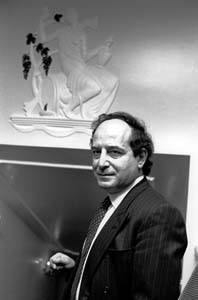
Francesco Pacifico in Sidecar (photo by Erling Mandelmann):
Roberto Calasso died this summer at the age of eighty. Among the unpindownable Italian erudites – Eco, Calvino, Pasolini – the author of the international bestseller The Marriage of Cadmus and Harmony (1988), a hybrid meditation on the enduring relevance of Greek myth, is perhaps the hardest to figure out. The Marriage was the second chapter of a hazy, complex and confounding project – Calasso called it an ‘opera’ and would never explain much further – that might be described as a sustained effort to unlock the mystical potential of literature. Extending to eleven volumes with La tavoletta dei destini (2020), it ranges across world history and geography, freely connecting Kafka and Baudelaire, the Vedas and the Bible, Tiepolo and Talleyrand, Mesopotamian and Greek mythology. Of the first installment, The Ruin of Kasch (1983) – whose wandering, eclectically citational reflections on ancient ritual and the nature of the modern established his procedure – Calasso wrote that he wanted to steer clear of the essay form as it had become ‘sclerotized’. ‘From aphorism to brief poem, from cogent analysis of some specific issue to narrated scene’, the book he’d written was rather ‘a whole host of forms…’
Calasso’s hybrids gained worldwide traction in the cosmopolitan eighties and nineties, touted by stars of international letters like Brodsky and Rushdie – the latter praising the erudition and mix of novelistic and essayistic in his book on Vedic theology, Ka (1996). Not perceived as part of a cohort or scene (in contrast to Pasolini and Nuovi Argomenti, or Eco and the Gruppo 63), Calasso was never characterised as particularly Italian, and this always inhibited popular understanding of his work.
More here.
